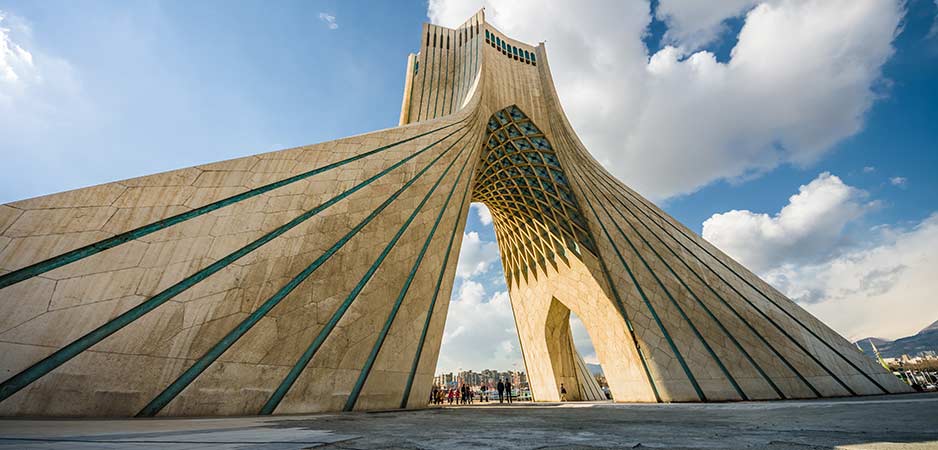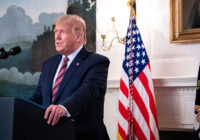Following Iran’s missile attacks on a two US airbase, one outside Baghdad and the second near Erbil in Iraqi Kurdistan, US President Donald Trump almost triumphantly announced that Iran is now standing down in their the two countries’ intensified conflict following the killing of Quds Force commander, General Qassem Soleimani, in an American drone attack on January 3. Dire predictions in the media, including from this observer, warned of hell to pay after Soleimani’s death. Indeed, Iranian officials and the public alike demonstrably called for severe acts of revenge.
Instead, the Iranians lobbed over a dozen missiles at the two US bases, at least one of which being the suspected launch point for the drone that killed Soleimani. No one was either hurt or injured. One senior Revolutionary Guards commander has averred that Iran purposely avoided targeting US personnel. If true, it represents a wise course of action by the Islamic Republic. Trump has repeatedly warned that he will respond forcibly to any killing of US citizens by Iran.
The US Will Never Leave the Middle East
But is Iran actually prepared to stand down? According to a report on January 9, there will indeed be follow-up attacks. That may be predictable, given the continuing chest-thumping on both sides in the 40 years of trash talk by the two countries. However, Iran actually may decide to wind down the military portion of its fight against the Americans, at least for the time being. It may have achieved some long-sought goals in its struggle. As any seasoned poker player understands, know when you’re ahead.
Exit America?
Perhaps the biggest potential win for Iran since the American missile strike is the vote by Iraq’s council of representatives, calling for the withdrawal of all US forces — there are approximately 5,000 — from Iraq. Since the US invasion in 2003, nothing has been more important for Iran than removing “The Great Satan” and the existential threat from neighboring Iraq. If Iraqi Prime Minister Adel Abdul Mahdi follows through on the Iraqi parliament’s vote, it will signify a strategic setback, if not defeat, for the US in Iraq and the Middle East.
A nearly 18-year investment of more than 4,500 American lives and more than $1.7 trillion (and still counting) will likely go down the drain. It will lend truth to Iranian officials’ repeated claims that America has lost its influence and standing in the Middle East. It would be hard to imagine a greater achievement for Iran and will truly have elevated Soleimani to stratospheric martyr status in Iran — and in the Shia Muslim world at large — for his sacrifice.
How likely is the actual departure of American forces from Iraq? Abdul Mahdi is now a caretaker prime minister after his publicly-sought resignation was accepted by the Iraqi president in December. So it isn’t certain whether he currently has the actual authority to order the US withdrawal. Moreover, most Iraqi Sunnis and Kurdish representatives boycotted the session when the vote for expulsion was taken; those who did attend mostly voted either against or abstained.
Even moderate Shia representatives and officials recognize the danger of an American withdrawal, affording as it would an almost red carpet for Iran into Iraq. That would contravene a key demand of the many mass popular demonstrations that have plagued Iraq for the last two months, namely that Iran must leave Iraq. By dialing back its response, Iran stands a better chance of achieving a major strategic objective in the region: America’s departure from Iraq. This probability must be counted as a plus for Tehran.
And Its Allies, Too?
There are other apparent wins for Iran. The US apparently failed not only to provide ample warning of its drone attack on Soleimani to the Iraqi government, but it seems it also neither coordinated with nor briefed its key allies in Europe or even warned Israel, which could have suffered as a consequence. Important Arab allies also did not receive advance notice.
To be sure, Israel and governments like Saudi Arabia’s officially applauded the elimination of the much-despised Quds Force commander, the architect of Iranian actions in Iraq, Syria, Lebanon, Yemen and elsewhere in the Middle East. Privately, however, they cannot be pleased at having been kept out of the loop. It suggests Donald Trump’s distaste for jointness, alliances and partnerships is now playing out. It’s not only “America First,” but also apparently “America Alone.”
That movement, if correct — and many establishment national security and foreign policy professionals in and outside of US government and in Congress are strenuously pushing back — would signal a tectonic shift in American foreign policy, not only favoring Iran but also Russia, China, North Korea, Venezuela, the Taliban in Afghanistan, and every terrorist group around the world. It also causes nervousness among America’s allies in the Middle East, who certainly count on US military and other backing. Furthermore, the US has been stronger because of its many allies standing with it. So, another check mark in the win column for Iran.
Enter Russia
Following the escalation of the tensions and the vote in Iraq’s parliament, the US announced its suspension of counter-Islamic State (IS) operations in the region. At first glance, that would appear as an adverse development for both Iran and especially Iraq. After its defeat by the US-led coalition, IS, which still counts almost 20,000 fighters in Syria and Iraq, needs breathing space and time to regroup.
Having just completed a visit to Damascus, Russian President Vladimir Putin must be thinking about returning Russia to Iraq following a near 18-year absence. Who better to pick up the aerial cudgel against IS than Russia, which it has proven more than capable of doing already against anti-Assad forces in Syria, effectively beating back what had once been a successful Syrian opposition?
Russian aircraft ruthlessly and systematically bombed opposition redoubts throughout most of Syria, without regard for civilians. It was the same brutal, scorched-earth approach employed against Russian opposition forces with devastating effectiveness in Chechnya in 1999-2000. That’s a strategy pro-Iranian Iraqi militia forces, which make up the majority of the 2 to 3 million-man Popular Mobilization Forces, and Iran can easily embrace. So no one should be surprised if Russia swoops in to fill in for the US and its multi-nation coalition.
None of this is likely to happen overnight. But Iran’s “strategic patience” in not responding more forcefully now and allowing for the impact of Trump’s much criticized decision to take full political effect might actually be a wise one. That appears to be another potential achievement for Tehran.
Iranians and Iraqis Lose
There are also big political wins for Iran inside its own politics and those of Iraq. Demonstrations that have racked both countries since early fall had shown no signs of letting up. In Iran, the government was under popular assault for its failures to deliver on the promises of the Islamic Revolution of 1979, rampant corruption, abjectly poor economic management and lack of basic democratic processes. Tehran’s response was to bring down the heavy fist, with more than 1,000 civilian demonstrators killed by Iranian security and paramilitary forces, according to some accounts.
In Iraq, too, demonstrators throughout the country, and especially in Shia-dominated provinces of southern Iraq, called for major changes in the governing constitution, an end to institutionalized sectarianism, actions to end corruption and improved government services and economic management. But they also wanted an end to outsize Iranian influence in, and a withdrawal of Iranian forces from, Iraq.
The latter so disturbed Iran’s Supreme Leader Ali Khamenei that he ordered Iranian commanders working with pro-Iranian Iraqi militias to quell the demonstrations to “Do whatever it takes to end it.” There’s no more telling statement of the supreme leader’s concern for Iran’s precarious position in Iraq. It seems, however, that all it took was the sacrifice of his top military commander — no doubt a painful but worthwhile trade.
So, for now, pro-democracy and reform forces in both nations have been silenced. To be sure, it will take much more real action in Baghdad and Tehran to end the clearly growing demands in both countries for significant change. But much time and effort will have been lost, not to mention the hopes of so many Iraqis and Iranians. But not for Ayatollah Khamenei — it’s another potential major accomplishment.
So, from Tehran’s perspective, why push the envelope? Things may actually be moving in its favor and against Washington. Time may be on its side, though not on that of the Iranian people still struggling under strangling US sanctions and government oppression. Better to wait and see how the conflict plays out and appear as the level-headed side in the conflict. Iran can always choose to turn to one of its many proxies throughout the region to harass and punish the US and do it repeatedly.
The “Carter Card”
The supreme leader also has one other major card to play that would affect Donald Trump personally. Call it the “Carter card.” In 1980, Jimmy Carter was up for reelection. At the time, he also wrestled with a major Iran issue, the taking of 52 American hostages in Tehran. Then-Supreme Leader Ayatollah Ruhollah Khomeini refused to release the hostages while Carter was in the White House — an inhumane and illegal, but nevertheless astute political act that ultimately contributed to Carter’s humiliating defeat by Ronald Reagan. Once Reagan was inaugurated, the hostages were immediately released.
Khamenei would be unwise to use the hostage ploy again. But there remain many other actions that he could take to embarrass Trump before this year’s presidential elections. Khamenei is well familiar with the Carter card option. Trump, an impulsive decision-maker and not especially known for vision, had better be aware as well.
Taken in sum, the Iranians appear to be thinking longer term, understanding that time and patience will dictate next steps. Donald Trump’s thinking, however, remains an enigma.
The views expressed in this article are the author’s own and do not necessarily reflect Fair Observer’s editorial policy.
Support Fair Observer
We rely on your support for our independence, diversity and quality.
For more than 10 years, Fair Observer has been free, fair and independent. No billionaire owns us, no advertisers control us. We are a reader-supported nonprofit. Unlike many other publications, we keep our content free for readers regardless of where they live or whether they can afford to pay. We have no paywalls and no ads.
In the post-truth era of fake news, echo chambers and filter bubbles, we publish a plurality of perspectives from around the world. Anyone can publish with us, but everyone goes through a rigorous editorial process. So, you get fact-checked, well-reasoned content instead of noise.
We publish 2,500+ voices from 90+ countries. We also conduct education and training programs
on subjects ranging from digital media and journalism to writing and critical thinking. This
doesn’t come cheap. Servers, editors, trainers and web developers cost
money.
Please consider supporting us on a regular basis as a recurring donor or a
sustaining member.
Will you support FO’s journalism?
We rely on your support for our independence, diversity and quality.






